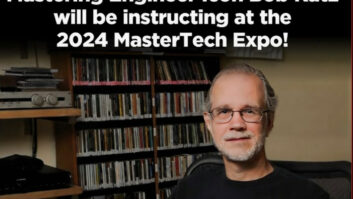Let’s begin this column with a pop quiz. Please have a No. 2 pencil available.
Question 1: Can you name the ingredients in a McDonald’s Big Mac?
Question 2: How does America spell relief?
If you’re like millions of other people, you know the answers to both, which begs the real question of “Why?” It’s because we’ve been effectively trained. Think about the two examples above: short, specific, memorable messages that are repeated over and over. That’s how we learned the answers. Effective training at its best.
From a dealer perspective, and especially within the tech-heavy world of CE retailing, effective training can improve customer service, reduce returns, reduce associate turnover, create a favorable first impression of your company and set new hire expectations.
But as important as training is to a retailer’s success, your company could be wasting its training dollars. As a recent USA Today headline stated, “Big Lesson: Billions Wasted On Job Skills Training.” Why it’s being wasted is easy to identify:
- Employees are bored
- Programs aren’t “real world”
- Training doesn’t reflect audience
- Some trainers lack practical retail experience
The goal of any training should be to improve associate performance by building their confidence. The end result would be better customer service. The challenge comes in the attempt to create a training environment that is informative, interactive and fun. Does your current training achieve this? Take an objective look. Start with these questions:
- Who heads up training? Is their background in retail, human resources or academia?
- Who makes training decisions?
These are important questions to ask yourself because training has a tendency to reflect a person’s background. Is it possible to develop an effective training program for a retailer if the person or people developing it don’t have a retail background? I’m not suggesting that one background is better than another; in fact, I feel it’s important to possess a little from each discipline. But the people you are developing the training for can tell if it’s based in retail reality or fantasy.
Some store training materials produced by corporate training departments have the right intentions but are out of touch with the stores. It’s based more on theory than on practical retail experience.
Material should be developed in conjunction with the stores, and written in the stores’ language, rather than that of a university professor’s. Talk to the people who manage and work the floor — they know what the deal is. They’ll also tell you what has worked in the past and what hasn’t. That’s what should be incorporated in any training material that’s produced.
When you let your store people get actively involved in the development of the material, you get more of a buy-in. Don’t simply base it on university studies that throw a bunch of statistics and percentages at you. Those numbers are meaningless when trying to train a group of sales people. Your goal as a trainer is to find a way to relate to the associates and keep their interest.
You also need to assess your trainers. Are they go-getters who are also effective communicators? Can they can teach others? Do they have outgoing and creative personalities? Do they make training fun? Are they passionate about the subject?
Some of the best trainers have actually come out of stores. Sure, they need some guidance on training techniques, but they make up for that with their knowledge of the day-to-day retail operations. That knowledge goes a long way. It can help the trainer build credibility in a training session. And once people know you’re going to be straight with them, and that the training will be interactive and fun, they have a tendency to pay more attention. That translates into better retention.
So take a good, hard, honest look. Does your company’s training instill the same confidence in you that you want to see in your people?
Bonus question: Complete the phrase “Plop, plop, fizz, fizz! Oh ____ _ _____ __ __!”
Effective training — amazing, isn’t it?
John Quattrucci is vice president in charge of training and development for Stuart & Associates, a retail/manufacturer consultancy specializing in returns reduction, extended warranties and training. For more information, call (615) 371-9322 or visit the company’s website at www.Bettersales.com .













